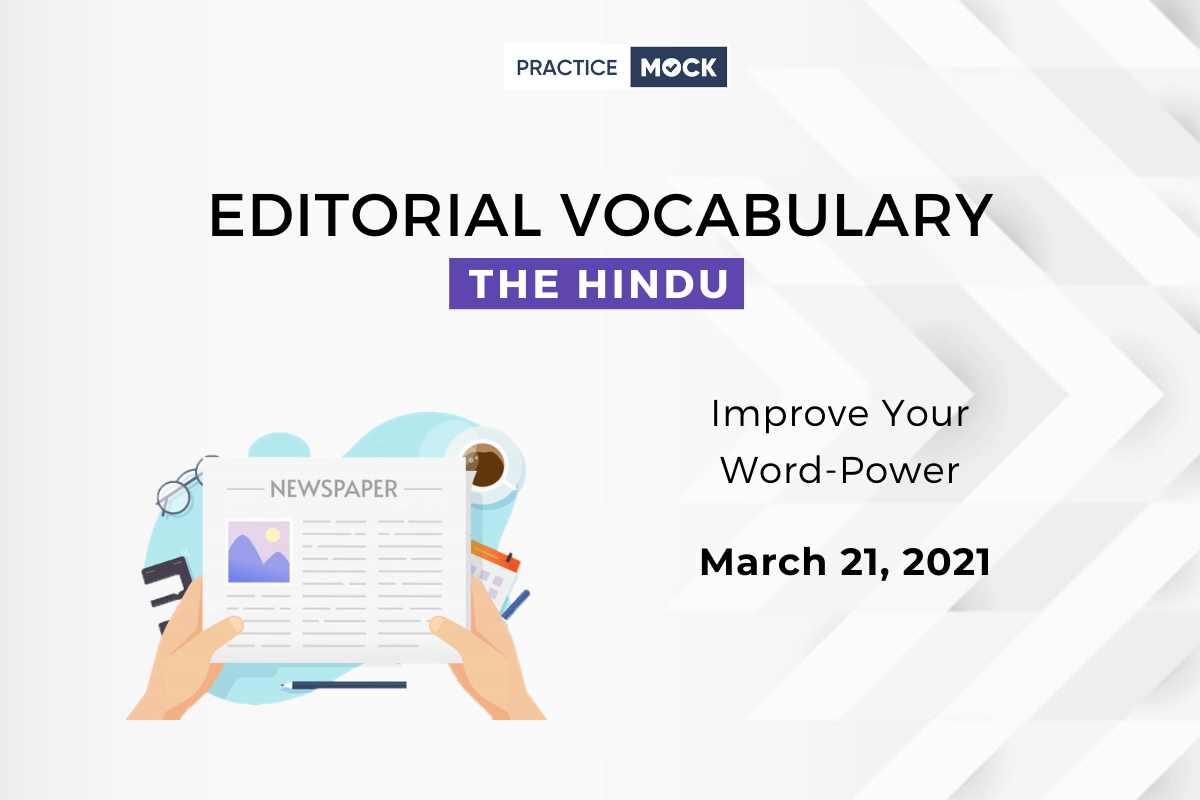Vocabulary is an integral part of the English section and thus one should always keep learning and revising new set of difficult words along with their contextual meanings. We keep publishing such daily Hindu editorial articles on a daily basis. Give it a read for today’s Hindu editorial.
Difficult Words & their Meanings
| Difficult Word/Phrase | Contextual Meaning |
| amend | to change something slightly |
| antithesis | exact opposite of something |
| entrusted | to make someone responsible for something |
| incongruous | unusual or different |
| envisages | to imagine or expect something in the future |
| collaborative | to work together or with someone else for a special purpose |
| void | unacceptable |
| rollback | an occasion when the influence of particular laws, rules, etc. is reduced |
| subvert | to damage something |
Delhi undermined: On Centre’s bid to run the National Capital Territory
Bill to amend GNCTD Act is a rollback of the notion of representative government
The Centre’s Bill seeking to amend (to change something slightly) the law relating to the running of the National Capital Territory of Delhi claims that it is aimed at giving effect to the interpretation given by the Supreme Court judgments on Delhi’s governance structure. The proposed changes are the very antithesis (exact opposite of something) of what the Court has said. The Bill, if it becomes law, will wholly undermine the Court’s efforts to strengthen the elected government vis-à-vis the appointed Lieutenant Governor. The Constitution Bench verdict of July 4, 2018, said: “The Lieutenant Governor has not been entrusted (to make someone responsible for something) with any independent decision-making power. He has to either act on the ‘aid and advice’ of the Council of Ministers, or he is bound to implement the decision taken by the President on a reference being made by him.” The ‘aid and advice’ clause pertains only to matters on which the elected Assembly has powers under the State and Concurrent Lists, but with the exception of public order, police and land, and, wherever there are differences between the L-G and the elected government, the former should refer the question to the President. The Court was at pains to clarify that the power to refer “any matter” to the President did not mean that “every matter” should be referred thus. The guiding principle was that the elected government should not be undermined by the unelected administrator. The Bill introduced in the Lok Sabha does violence to this interpretation.
The Bill seeks to declare that in the context of legislation passed by the Delhi Assembly, all references to the ‘government’ would mean the “Lieutenant Governor”. Indeed, Delhi is a Union Territory; but it is somewhat incongruous (unusual or different) for a territory with an elected House to be declared the sole domain of the L-G. The apex court had rightly concluded that the scheme set out in the Constitution and the Government of National Capital Territory of Delhi Act, 1991, envisages (to imagine or expect something in the future) a collaborative (to work together or with someone else for a special purpose) structure that can be worked only through constitutional trust. The proviso to Article 239AA, which empowers the L-G to refer a difference of opinion with the Council of Ministers to the President, does not mean that the administrator is given an opportunity to come up with a different opinion on every decision made by the Ministry. Yet, it is precisely what the Bill proposes to do. And it is quite incongruous that instead of Parliament identifying the matters on which the L-G’s opinion should be sought, the Bill proposes that the L-G himself would specify such matters. The clause that declares void (unacceptable) any rule that empowers the Assembly or its Committees to discuss any matter of day-to-day administration or conduct enquiries amounts to a rollback (an occasion when the influence of particular laws, rules, etc. is reduced) of representative government. The ‘Union Territory’ concept is one of the many ways in which India regulates relations between the Centre and its units. It should not be used to subvert the basis of electoral democracy.
- Sign Up on Practicemock for Updated Current Affairs, Free Topic Tests and Free Mini Mocks
- Sign Up Here to Download Free Study Material
Free Mock Tests for the Upcoming Exams
- RRB PO 2024 Free Mock Test
- RRB Clerk 2024 Free Mock Test
- SSC MTS Free Mock Test
- SSC CHSL Free Mock Test
- SSC CGL Free Mock Test
- GATE Mechanical Free Mock Test
- GATE Civil Free Mock Test
- NABARD Gr. A Free Mock Test
- SBI Clerk Mains Free Mock Test
- SSC CPO Free Mock Test
- AFCAT Free Mock Test
- CAT Free Mock Test
- NIACL Assistant Free Mock Test
- UIIC AO Free Mock Test
- UIIC Assistant Free Mock Test
- GIC Assistant Manager Free Mock Test
- NICL AO Free Mock Test
- Free SSC Live Test
- UPSC CSAT Free Mock Test
- CDS-I Free Mock Test
- RRB ALP Free Mock Test


